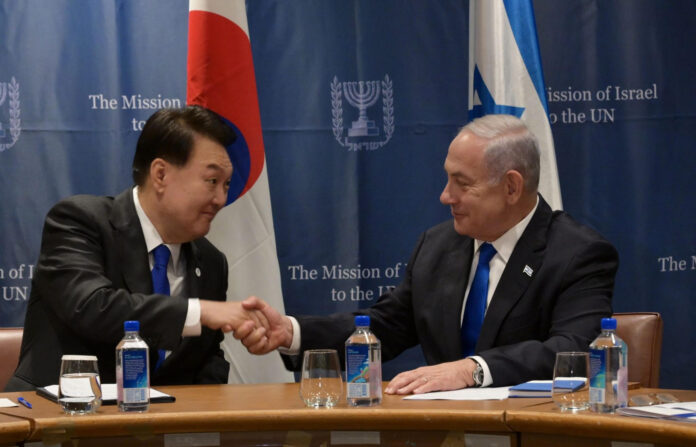
Saudi Arabia will create a new Middle East and bring Jewish and Muslim religions closer together Prime Minister Benjamin Netanyahu told the United Nations General Assembly in a keynote address.
A sparse gathering included a Saudi Arabian delegate who applauded his speech.
Netanyahu’s UN speech was broadcast live in Saudi Arabia and culminated a week-long visit that included a meeting with US President Joe Biden. Overviewing the high-profile trip, he observed: “I think we achieved much on the visit and intend to bring good things for Israel.”
Netanyahu warned the Assembly when he last addressed them in 2018 about the “tyrants of Tehran” who were a curse to their “own people, region and entire world”. At the time he explained that the threat of Iran had brought Israel and Arab states closer than in his lifetime and a day would come when Israel expanded peace beyond Egypt and Jordan to other Arab neighbours.
Delegates, then, dismissed his optimism as “wishful thinking” as only a peace agreement with the Palestinians would see agreements from Arab states. That narrative, however, had changed due to peace agreements with the United Arab Emirates, Bahrain, Sudan and Morocco. Netanyahu still seeks peace with the Palestinians but they must not be given a veto over new peace treaties with Arab states.
“The Palestinians could greatly benefit from a broader peace, they should be part of the process, but they should not have a veto over the process,” he explained. “Making peace with more Arab states would increase the prospects of making peace between Israel and the Palestinians.
“The Palestinians are only 2% of the Arab world. When the Palestinians see that most of the Arab world has reconciled itself to the Jewish state, they too will be more likely to abandon the fantasy of destroying Israel and finally embrace a path of genuine peace with it.
“The Abraham Accords were a pivot of history. Trade and investment with our new peace partners are booming. Our nations cooperate in commerce, energy, water, agriculture, medicine, climate and many other fields. There’s no question, the Abraham Accords heralded the dawn of a new age of peace.”
Netanyahu welcomed the prospect an historic peace with Saudi Arabia.
“Such a peace will go a long way to ending the Arab-Israeli conflict,” he said. “It will encourage other Arab states to normalise relations with Israel. It will enhance the prospects of peace with the Palestinians. It will encourage a broader reconciliation between Judaism and Islam, between Jerusalem and Mecca, between the descendants of Isaac and the descendants of Ishmael. All these are tremendous blessings.”
Netanyahu hailed a visionary corridor across the Arabian Peninsula and Israel connecting India to Europe with maritime links, rail links, energy pipelines and fibre-optic cables.
And he said that antisemitism must be rejected on the left or right, halls of universities or at the UN.
Netanyahu said that he and President Joe Biden shared the same optimism for what can be achieved in terms of peace and then castigated the Iranian regime.
“Iran continues to spend billions to arm its terror proxies,” he said. “It continues to extend its terror tentacles in the Middle East, Europe, Asia, South America, even North America. Iran continues to threaten international shipping lanes, hold foreign nationals for ransom and engage in nuclear blackmail. Iran’s drones and missile program threaten Israel and our Arab neighbours. And Iran’s drones have brought and bring death and destruction to innocent people in the Ukraine.
“Yet the regime’s aggression is largely met by indifference in the international community. Sanctions must be snapped back and above all, Iran must face a credible military threat. As long as I am Prime Minister of Israel, I will do everything in my power to prevent Iran from getting nuclear weapons.”
Netanyahu talked about the AI revolution which was progressing at lightning speed. But there were perils that included a disruption of democracy, minds, crime, hacking systems and AI-driven wars.
Netanyahu called on leading nations, however competitive, to address dangers quickly.
He explained: “Imagine finally cracking the genetic code, extending human life by decades and dramatically reducing the ravages of aging. Imagine healthcare tailored to each individual’s genetic composition and predictive medicine.”
Netanyahu said there could an end to traffic jams, personalised education, clean energy and natural resources for all nations. He added: “With AI we can explore the heavens as never before and extend humanity beyond our blue planet. The developments of AI will be spearheaded by a handful of nations. I am confident AI developed by Israel will help all humanity.”
Netanyahu called on world leaders to shape the future in a “responsible and ethical way”.
During a hectic series of meetings with world leaders Netanyahu met UN Secretary General Antonio Guterres, calling on him to change the organisations’ criticism of the State of Israel and to condemn Iranian and Palestinian terrorism against Israelis.
Netanyahu discussed international and regional issues with South Korean President Yoon Suk Yeol, global AI implications with former Google CEO Eric Schmidt, who accepted an invite to join his advisory forum on the topic, and a highlight was meeting former US Secretary of State Henry Kissinger.









